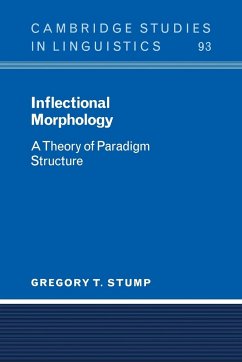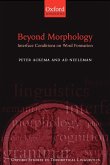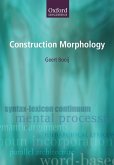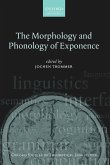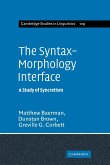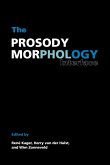This book presents a formal framework for the analysis of word structure in human language.
A new contribution to linguistic theory, this book presents a formal framework for the analysis of word structure in human language. It sets forth the network of hypotheses constituting Paradigm Function Morphology, a theory of inflectional form whose central insight is that paradigms play an essential role in the definition of a language's system of word structure. The theory comprises several unprecedented claims, chief among which is the claim that a language's realization rules serve as clauses in the definition of a paradigm function, an overarching construct which is indispensable for capturing certain kinds of generalizations about inflectional form. This book differs from other recent works on the same subject in that it treats inflectional morphology as an autonomous system of principles rather than as a subsystem of syntax or phonology and it draws upon evidence from a diverse range of languages in motivating the proposed conception of word structure.
Table of contents:
Acknowledgments; List of abbreviations; 1. Inferential-realizational morphology; 2. Paradigm functions; 3. Rule competition; 4. Headedness; 5. Rule blocks; 6. Stem alternations; 7. Syncretism; 8. Conclusions, extensions and alternatives; Notes; References; Index.
Hinweis: Dieser Artikel kann nur an eine deutsche Lieferadresse ausgeliefert werden.
A new contribution to linguistic theory, this book presents a formal framework for the analysis of word structure in human language. It sets forth the network of hypotheses constituting Paradigm Function Morphology, a theory of inflectional form whose central insight is that paradigms play an essential role in the definition of a language's system of word structure. The theory comprises several unprecedented claims, chief among which is the claim that a language's realization rules serve as clauses in the definition of a paradigm function, an overarching construct which is indispensable for capturing certain kinds of generalizations about inflectional form. This book differs from other recent works on the same subject in that it treats inflectional morphology as an autonomous system of principles rather than as a subsystem of syntax or phonology and it draws upon evidence from a diverse range of languages in motivating the proposed conception of word structure.
Table of contents:
Acknowledgments; List of abbreviations; 1. Inferential-realizational morphology; 2. Paradigm functions; 3. Rule competition; 4. Headedness; 5. Rule blocks; 6. Stem alternations; 7. Syncretism; 8. Conclusions, extensions and alternatives; Notes; References; Index.
Hinweis: Dieser Artikel kann nur an eine deutsche Lieferadresse ausgeliefert werden.

